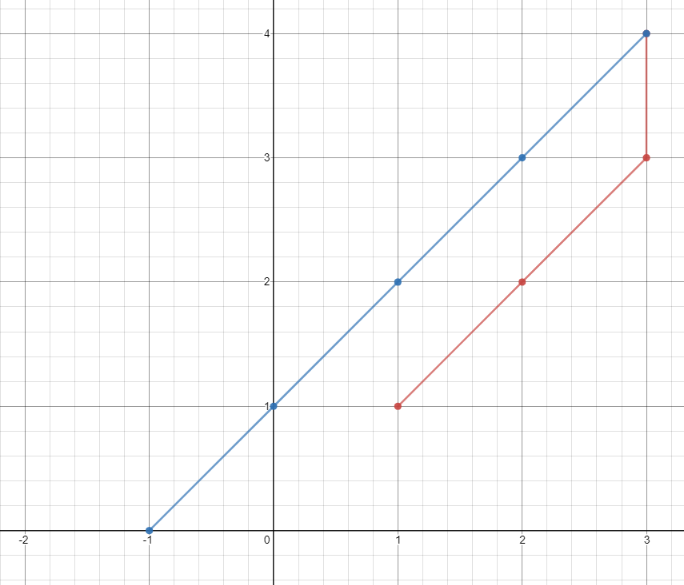| comments | difficulty | edit_url | rating | source | tags | |||
|---|---|---|---|---|---|---|---|---|
true |
Easy |
1302 |
Weekly Contest 164 Q1 |
|
On a 2D plane, there are n points with integer coordinates points[i] = [xi, yi]. Return the minimum time in seconds to visit all the points in the order given by points.
You can move according to these rules:
- In
1second, you can either:<ul> <li>move vertically by one unit,</li> <li>move horizontally by one unit, or</li> <li>move diagonally <code>sqrt(2)</code> units (in other words, move one unit vertically then one unit horizontally in <code>1</code> second).</li> </ul> </li> <li>You have to visit the points in the same order as they appear in the array.</li> <li>You are allowed to pass through points that appear later in the order, but these do not count as visits.</li>
Example 1:
Input: points = [[1,1],[3,4],[-1,0]] Output: 7 Explanation: One optimal path is [1,1] -> [2,2] -> [3,3] -> [3,4] -> [2,3] -> [1,2] -> [0,1] -> [-1,0] Time from [1,1] to [3,4] = 3 seconds Time from [3,4] to [-1,0] = 4 seconds Total time = 7 seconds
Example 2:
Input: points = [[3,2],[-2,2]] Output: 5
Constraints:
points.length == n1 <= n <= 100points[i].length == 2-1000 <= points[i][0], points[i][1] <= 1000
For two points
If
We can iterate through all pairs of points, calculate the minimum distance between each pair of points, and then sum them up.
The time complexity is
class Solution:
def minTimeToVisitAllPoints(self, points: List[List[int]]) -> int:
return sum(
max(abs(p1[0] - p2[0]), abs(p1[1] - p2[1])) for p1, p2 in pairwise(points)
)class Solution {
public int minTimeToVisitAllPoints(int[][] points) {
int ans = 0;
for (int i = 1; i < points.length; ++i) {
int dx = Math.abs(points[i][0] - points[i - 1][0]);
int dy = Math.abs(points[i][1] - points[i - 1][1]);
ans += Math.max(dx, dy);
}
return ans;
}
}class Solution {
public:
int minTimeToVisitAllPoints(vector<vector<int>>& points) {
int ans = 0;
for (int i = 1; i < points.size(); ++i) {
int dx = abs(points[i][0] - points[i - 1][0]);
int dy = abs(points[i][1] - points[i - 1][1]);
ans += max(dx, dy);
}
return ans;
}
};func minTimeToVisitAllPoints(points [][]int) (ans int) {
for i, p := range points[1:] {
dx := abs(p[0] - points[i][0])
dy := abs(p[1] - points[i][1])
ans += max(dx, dy)
}
return
}
func abs(x int) int {
if x < 0 {
return -x
}
return x
}function minTimeToVisitAllPoints(points: number[][]): number {
let ans = 0;
for (let i = 1; i < points.length; i++) {
let dx = Math.abs(points[i][0] - points[i - 1][0]),
dy = Math.abs(points[i][1] - points[i - 1][1]);
ans += Math.max(dx, dy);
}
return ans;
}impl Solution {
pub fn min_time_to_visit_all_points(points: Vec<Vec<i32>>) -> i32 {
let n = points.len();
let mut ans = 0;
for i in 1..n {
let x = (points[i - 1][0] - points[i][0]).abs();
let y = (points[i - 1][1] - points[i][1]).abs();
ans += x.max(y);
}
ans
}
}#define max(a, b) (((a) > (b)) ? (a) : (b))
int minTimeToVisitAllPoints(int** points, int pointsSize, int* pointsColSize) {
int ans = 0;
for (int i = 1; i < pointsSize; i++) {
int x = abs(points[i - 1][0] - points[i][0]);
int y = abs(points[i - 1][1] - points[i][1]);
ans += max(x, y);
}
return ans;
}